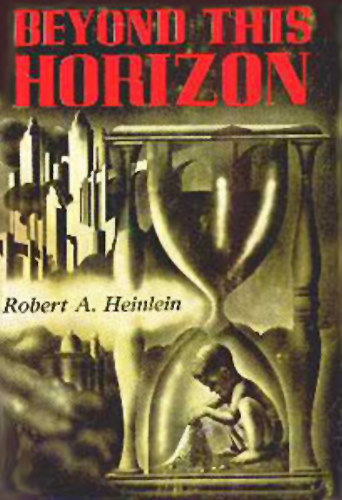The traveling circus has moved to Osaka, Japan's second metropolis. It's a grubby, earthy place, with a colorful dialect and brasher manners. For an American, it's actually kind of refreshing; the formality is less forced. Like Tokyo, the city is alive with new construction and industry. In contrast to cities back home, which have infrastructure dating back to the turn of the century, Japan looks like the future.

It was thus the perfect place to finish Heinlein's Beyond this Horizon, which was first published under a pseudonym back in 1942 and republished under his own name in 1948. This was a second-hand copy I'd picked up specifically for this trip.
Beyond this Horizon is an odd duck of a novel, particularly in comparison to Heinlein's recent, more conventional works (i.e. The Puppet Masters, The Door into Summer, etc.). It divides neatly into three parts, and only the middle section has any real plot. I didn't read the version originally serialized in Astounding, but I imagine much of the disjointed nature stems from the story having been written for magazine publication.
The book is set in a utopic far future, and it follows the life of Hamilton Felix (the order of names is reversed, Japanese-style, for reasons central to the premise of story). He is the genetically superior result of a dozen generations of eugenic breeding. In this regard, he is no different from most of his fellows. Most everyone on Earth in the story is the result of the weeding out of undesirable traits and the promotion of positive ones. People are allowed to find their own mates, but the children are artificially assisted to be the best possible offspring. Only the “control normals” are left unmodified.
Hamilton's primary involvement in the story is to be resistant to the possibility of having offspring (the first part), to infiltrate and disrupt a revolutionary group bent on deposing the world government and eliminating the control normals (the second part), and to give in to having offspring (the third part). Hamilton's children offer glimpses into an understanding of the world beyond the veil of mortality, the philosophical and scientific exploration of which is a recurring theme.
It is difficult to tell with Heinlein when he is portraying the mores and opinions of his characters and when his characters are simply spouting the mores and opinions of Heinlein. I suspect the latter is more common. I find this book fascinating as it makes a point of distinguishing between bad eugenics (which led to two devastating wars in Beyond's timeline) and good eugenics as practiced by the government in the book. Hamilton is, himself, dubious of the benevolence of the concept as exemplified by his statement in Part 1, “There is something a little terrifying about a man with too long a view.” Given that the world war raging at the time the book was written was in large part motivated by eugenics, the positive portrayal of same is a bit disturbing.
On the other hand, Heinlein may simply be a seer. In the book, the field of ultramicroscopy makes genetic mapping possible and turns breeding into a scientific art. With the recent discovery of DNA by Watson and Crick, we seem right on Heinlein's predicted schedule. Who's to say that we won't soon find it desirable to edit out the genes that may cause disease and disorder for the good of humanity?
The other concept explored by Heinlein in the book is the idea of universal bearing of arms. Most of the men pack heat (so long as they are sober), and many women as well. It is made clear by the wearing of distinctive clothing that one is in an unarmed state, and those wearing the signifying brassards must defer to their armed fellows.
For most of the book, the practice is neither lauded nor condemned. It simply is. Near the end, however, one of the main characters praises the practice. He recites the old maxim, “An armed society is a polite society.” As depicted in Heinlein's novel, an armed society is an overly peevish one, prone to potentially lethal dueling for the most trifling of insults. The other justification is that it weeds out the overly combative, a crude element of the eugenics project, essentially. I suppose this makes sense coming out of the mouth of someone in Beyond's world. I hope Bob Heinlein doesn't agree with him.
There are no female viewpoint characters, but many strong women are featured, and one has a decidedly central role to play in scouting “Beyond this Horizon.” I don't know if Heinlein was exceptionally progressive (this was 1942!), or if we've simply gone backwards since the war. Perhaps both–Heinlein generally populates his stories with smart, resourceful females, even if they are never quite the star.
Hamilton's son, the only child character, does not fare so well. In fact, other than his spotless genetics, I can find nothing at all to endear him to anyone. I don't know if Heinlein has kids, but I'd bet that he was not a father back in 1942, otherwise the relationship between dad and boy would have rung more true. On the other hand, perhaps the lack of connection was meant to be a commentary on the world they inhabited.
In summary, Beyond this Horizon is a bit of a meandering, preachy mess. It is, however, quite readable. Moreover, like many of Heinlein's works, it does an excellent job of portraying a future, if not the future. Heinlein presents the technology and culture with a glib vagueness that will help preserve the novel from becoming dated.
3 stars out of 5.
(Confused? Click here for an explanation as to what's really going on)
This entry was originally posted at Dreamwidth, where it has comments. Please comment here or there.
